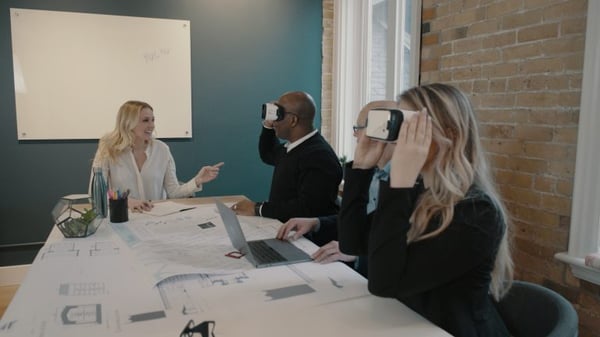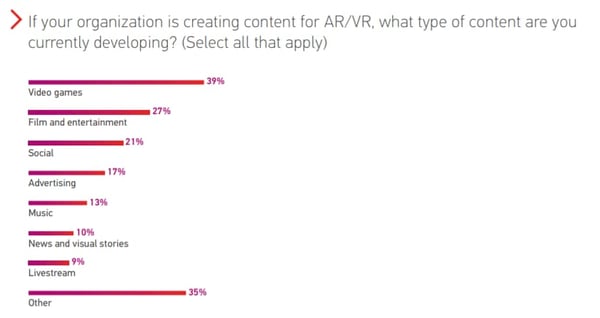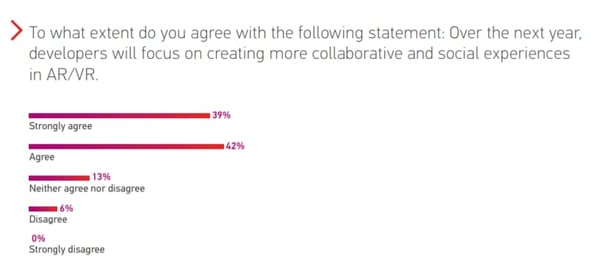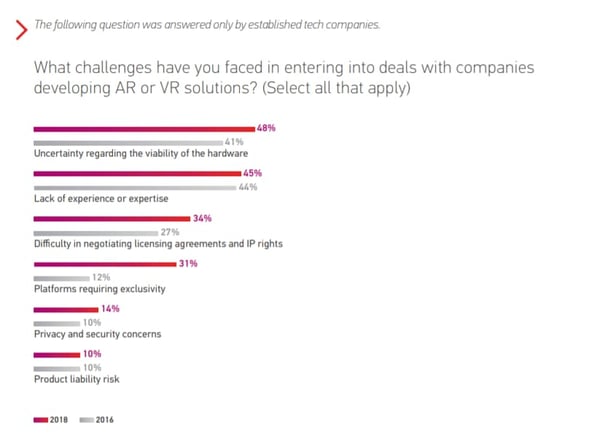Augmented reality (AR) and virtual reality (VR) have seen a recent boom of users. When the topic of AR/VR comes up, most people link this technology with gaming. Computer and video games have been extremely popular in this century. Whether a person games by themselves or with others, it has become a popular recreational activity for people of all age groups. Global reports found that the average gamer aged 18-25 spends seven hours a week gaming. Gamers show incredible commitment and consistency within their virtual realms, an experience that is exciting and transformative. With AR and VR technology, that experience is enhanced to the point of full immersion. In 2014, less than a million users were using AR/VR technology, but the number is projected to rise to reach 171 million users by the end of 2018. Of course, on the entertainment front, AR/VR has been extremely successful; but how can corporations use this technology in a practical way to set their businesses apart from their competitors?

In 2016, global law firm Perkins Coie LLP conducted a study with a keen interest on the rise of virtual and augmented reality technology. Over 650 participants (entrepreneurs, technology executives etc.) took part in the survey that assessed the AR/VR industry and highlighted key concerns from users reported back by businesses. Additionally, the survey sought to explore from industry experts how practical of a tool AR/VR technology is, and what the foreseeable future will look like with it. The general consensus in regards to the use and area of investment for AR/VR technology was dominated by the gaming industry (78%) In March 2018, a new survey, coupled with a few questions from the 2016 questionnaire was conducted and produced rather interesting results.
“Not everyone is a gadget freak. The industry needs to appeal to those who aren’t”
- Mixed reality (MR) startup developer
The “Others” in the AR/VR Industry
Despite popular belief, the gaming industry may be evicted from their #1 spot in the coming future. Perkins Coie LLP’s 2018 survey shows that companies are increasingly using advancements in AR/VR as a practical business tool/solution in achieving their goals and overall success.

Referring to the graphic above, 39% of respondents were in the business for making AR/VR content related to video games. However, just 5% shy of first place, the second largest group, at 35%, were those in the “other” section. This group of respondents includes companies that are using this technology to target industries like architecture and engineering. Looking at this trend of tech executives and entrepreneurs investing in industries unrelated to entertainment, we are transitioning into a major shift with the utilization of AR/VR. The survey results show that the market for AR/VR technology is changing, with an increasing number of individuals realizing its value and business potential.
Collaboration to Heal Social Disconnects
A common concern brought up with the use of AR/VR technology is the increased possibility of isolation, and heightened disconnection, of individuals from society. The totally immersive experience could prompt one to spend hours upon hours in a different reality, without much appetite to return back to actual reality. However, advancements in AR/VR have introduced new features in hopes of increasing greater collaboration amongst users to combat this concern.

Participants in the survey expressed that in the following year (referring to 2019), technology developers would focus on creating more collaborative features and social experiences in AR/VR. 81% of all respondents voted that they strongly agreed or agreed, and more importantly, 0% of respondents strongly disagreed with this statement. With absolutely none of the respondents strongly disagreeing against this statement, the importance and demand for collaboration within projects become highlighted.
Respondents were also expecting that AR/VR developers would be focusing their efforts on innovating more tools and apps for smartphones, enhancing collaboration between parties through one of the most accessible modes. This way of sharing designs and ideas drastically transforms the way we visualize projects. Since AR/VR technology almost rids any miscommunication or translation errors of details within a project, businesses have been more inclined to adopt this into their business model.
Here at Yulio, we thrive to simplify the process of collaboration and make it accessible to all parties. Our Collaborate mode allows everyone to meet in the same virtual space regardless of physical location.
Barriers and Concerns about AR/VR
A key concern with using AR/VR technology is the possibility of being isolating and detaching one from society. We addressed how AR/VR businesses are addressing this issue, but what other uncertainties may potential users have before using this tech?
 Challenges AR/VR companies face remain fairly consistent compared to the previous survey in 2016.
Challenges AR/VR companies face remain fairly consistent compared to the previous survey in 2016.
Tech companies have expressed that potential users have been cautious about the hardware use (48%) and the lack of experience/expertise from businesses who utilize this technology (45%). Understandably, the advancements in this industry make it unwelcoming and inaccessible to seamlessly maneuver effectively and produce better results. Although AR/VR developers are continually making advancements and better adjustments to the technology, keeping up with the changes can prove to be difficult especially navigating through a completely new yet transformative platform. As such, companies must continue to invest time and effort into making their product easy to use and provide adequate support until this issue no longer is a problem. To understand more about this industry, and to receive personal support navigating through this technology, you can use our user guide and directly contact us to schedule a webinar.
AV/VR are Here to Stay
With our society heading into a more technically complex time, it is important to consistently keep up with technological advancements to stay relevant. It's safe to say that AR/VR are here to stay, and we'll be seeing it lots more in the future. It is time to become familiar with how the technology works, how to integrate it for your company’s needs and watch it transform the way you visualize your creations. Perkins Coie LLP conclude their findings by quoting a respondent sharing the confidence that this technology “will create significant rewards for both developers and players in the not-too-distant future”.
We would like to extend a special thank you to Perkins Coie LLP for their in-depth and informative surveys. Please click here to view their 2016 and 2018 survey.
At Yulio, we strive for excellence in performance and integrity when it comes to our programs, and customer service. To learn more about us and what we offer, please visit our page or take our product tour . To try our program for yourself, sign up for our free 30-day trial (no strings attached).



.jpg?width=245&height=150&name=active-adult-beautiful-1799244%20(1).jpg)

